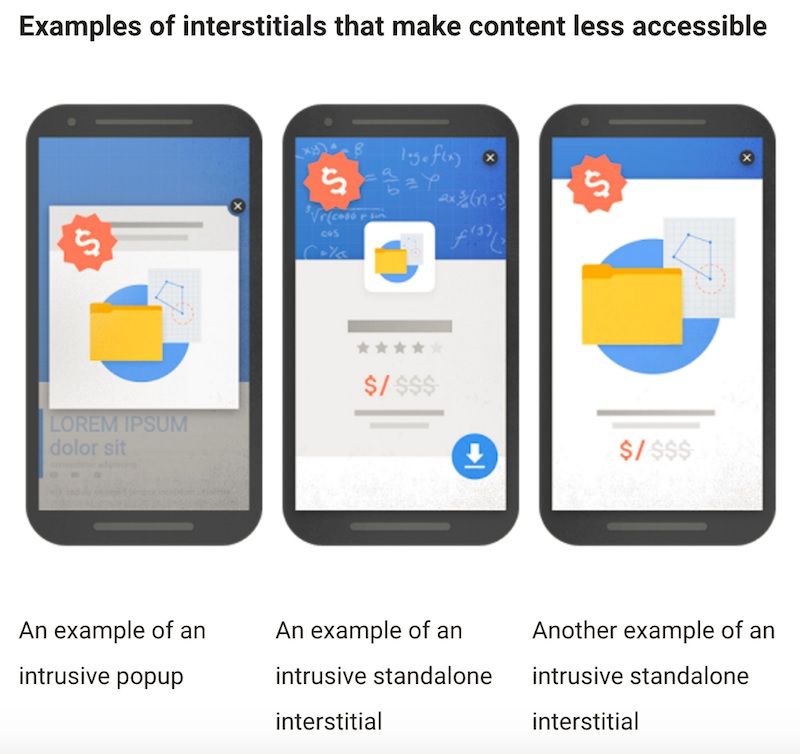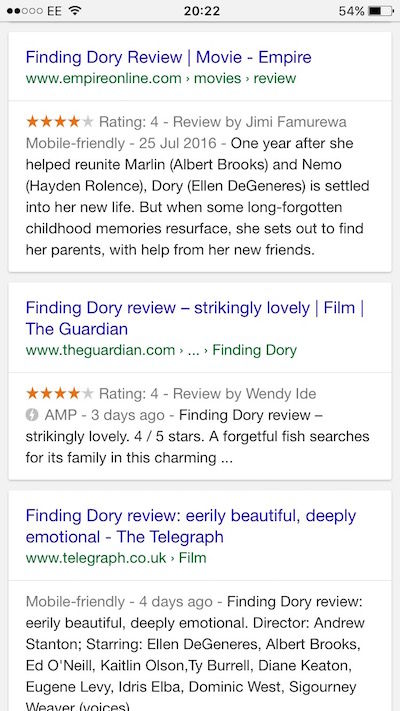Welcome to our weekly round-up of all the latest news and research from the worlds of search, search marketing, and beyond.
In this week's round-up, we have two big changes for mobile on Google, plus some more insight into a change that Google made to its AdSense policy recently.
And if you've ever thought about switching off from technology altogether, it turns out you're not alone: more than 30% of internet users have taken a 'digital detox' in the past year.
Google to penalize annoying mobile interstitialsAl Roberts reported for Search Engine Watch this week on how Google is taking aim at sites with annoying mobile interstitials (an item which displays before or after the expected content, like a pop-up ad) by penalising them with lower rankings.
Starting on 10th January 2017, Google will adjust its algorithm so that sites "where content is not easily accessible to a user on the transition from the mobile search results may not rank as highly."
A post on the Google Webmaster Central blog provided some examples of techniques that Google thinks are harmful to the user experience on mobile:

In the same blog post in which Google laid out its plans to penalise unfriendly interstitials, Google announced that it would be getting rid of the 'mobile-friendly' label which has been a mainstay of the mobile search page for the past two years.
Designed to help users find content "where the text and content was readable without zooming and the tap targets were appropriately spaced", Google has decided that the 'mobile-friendly' label has outlived its purpose now that 85% of pages in the mobile search results now meet this criteria.
Score one for the mobile web!
Google removes its AdSense ad limit policyGoogle was recently spotted changing its ad placement policies for AdSense to remove the 'ad limit per page' section. Search Engine Journal reported on the change this week, and contacted Google to confirm that it had indeed removed the limit on advertising.
From Search Engine Journal:
Using the WayBack Machine, you can see that the policy once read as follows:
"Currently, on each page AdSense publishers may place:– Up to three AdSense for content units– Up to three link units– Up to two search boxes
Publishers may not place more than one "large" ad unit per page. We define a "large" ad unit as any unit similar in size to our 300×600 format. For example, this would include our 300×1050 and 970×250 formats, our 750×200 and 580×400 regional formats, and any other custom sized ad with comparable dimensions."
Now, you can see in Google's current ad placement policies that the 'ad limit per page' section has been removed. It has been replaced with a section titled 'valuable inventory', which cautions site owners not to let the amount of ads on a page exceed the amount of actual content. Doing so may result in Google limiting or disabling ads served on the page until appropriate changes are made.
Search Engine Journal's article delves into Google's reasons for the change, which includes reducing the amount of slideshow-based content designed to get around the ad limit, and encouraging advertisers to use new mobile-friendly ad units.
SEJ writer Matt Southern considers whether publishers might begin to abuse their advertising privileges now that the limit has been lifted. But I can't help noticing that the new guidelines also make the terms under which Google can penalise content a lot more subjective.
Will this cause problems for publishers when they run afoul of rules they didn't even realise have changed?
AMP now supports A/B testingGoogle's Accelerated Mobile Pages (AMP) initiative continues to evolve. At the beginning of this month, Google announced that AMP support is being rolled out across the entire organic search results page on mobile. Kenny Chung has taken a detailed look at who benefits from implementing AMP in the wake of the update.
Now, The SEM Post's Jennifer Slegg has reported on a change that might make implementing AMP more appealing to businesses and marketers: AMP now supports A/B testing.
"If you have been wanting to do some A/B testing on your AMPlified page performances, AMP is now supporting a new <amp-experiment> which gives publishers flexibility to test variations of pages. This is especially good news for those publishers wanting to monetize better as well as for advertisers that are currently testing out using AMP for landing pages."
You can read the full announcement on AMP's blog here.
 AMP results featured in organic mobile search
AMP results featured in organic mobile search
Finally, we have some interesting revelations from Ofcom's 2016 Communications Market Report about the popularity of 'digital detoxing' in the UK. According to the report, 15 million UK internet users, or 34%, have spent a period of time offline in order to strike a healthier balance between technology and offline life.
The report also found that digital detoxes were most popular with the most wired-in age group: 16-24-year olds, 52% of whom have taken a digital detox in the past year. On the flip side, 34% of internet users say they "would definitely not like to do a digital detox".
Luke Richards gives more details about the report's findings on digital detoxing and what they mean in his article for Search Engine Watch.
Want to stay on top of the latest search trends? Get top insights and news from our search experts.
Related readingWelcome to our weekly round-up of all the latest news and research from around the world of search marketing and beyond.
In a poll conducted to accompany the ClickZ Intelligence Digital Trends 2016 report, nearly a quarter of respondents identified content marketing as the key trend for their company this year.
What do you imagine is the future of search?
New research show a disparity in sales growth between pure-play online retailers and their multichannel counterparts.
Source: Five most interesting search marketing news stories of the week
No comments:
Post a Comment